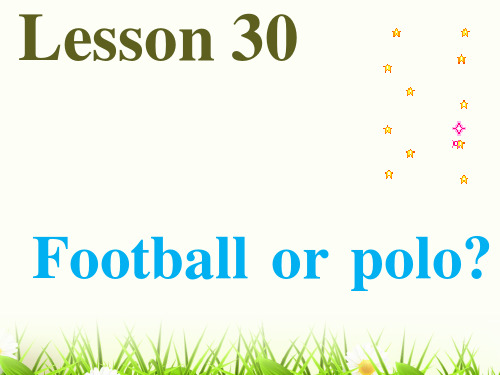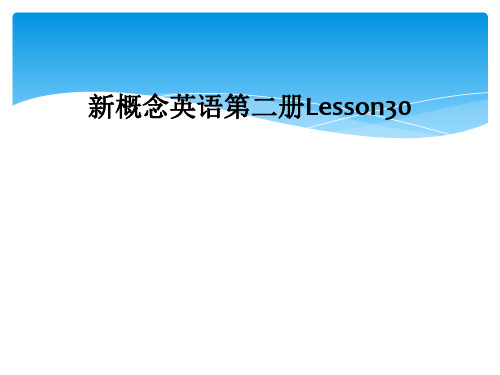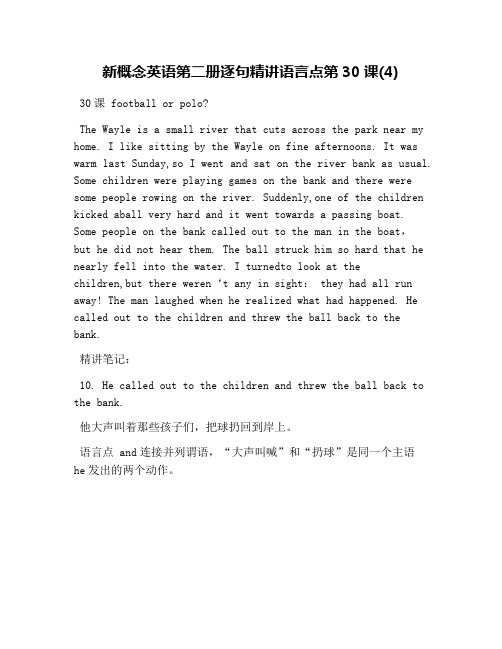新概念英语第二册:第30课课文详解及语法解析
新概念二第30课PPT

目录
• 课文概述 • 词汇学习 • 语法解析 • 课文分析 • 学习总结
01
课文概述
课文背景
• 课文背景:新概念英语第二册第30课主要讲述了一个关于旅游的话题,介绍了旅游的益处以及旅游时需要注意的事项。
课文内容
课文内容
本课主要分为三个部分,第一部分介绍了旅 游的益处,包括放松身心、拓展视野、结交 新朋友等;第二部分介绍了旅游时需要注意 的事项,如保持安全、注意卫生等;第三部 分则通过一个对话的形式,让学生更好地理
提高阅读理解能力
本课提供了一篇短文,通过阅读这篇短文,可以提高阅读 理解能力和阅读技巧。
学习建议
01
02
03
多做练习
为了巩固所学知识,建议 多做一些相关的练习题, 如单项选择、完形填空等。
Байду номын сангаас
注重实际运用
学习语言的目的在于交流, 因此应注重实际运用,多 与母语人士交流,提高口 语和听力能力。
定期复习
为了防止遗忘,建议定期 复习所学内容,加深记忆 和理解。
3
从句
本课中也出现了从句,如“When she was at the party, she danced all evening.”,从句的使用使句子更加复杂, 能够表达更丰富的意思。
句子翻译
“It was the first time that she had ever been abroad.” 可以翻译为“这是她第一次 出国。”
学习反馈
知识点掌握情况
通过本课的学习,我掌握了重点词汇和 表达方式,理解了条件状语从句和虚拟 语气的用法,提高了阅读理解能力。
课程安排
本课的课程安排紧凑合理,内容丰富 有趣,让我对英语学习充满了兴趣和 动力。
新概念英语第二册第30课概要

were some people rowing on the river.
用过去进行时描述故事背景rowing现在分词表伴随状语
Suddenly, one of the children kicked a ball very hard and
it went towards a passing boat, but he did not hear them.
1
2
3
4
特指 加 the
在海洋、 河流、 湖海、 山脉前 加 the
在方位词 前加the
The + 单数名 词表类 别
1. any通常用于否定句 2. 和疑问句中。 3. 4. 5. 6. 7. 8. Is there any milk in the bottle ? 瓶子里有牛奶吗? There isn’t any milk in the bottle. 瓶子里没有牛奶。
Grammar in use
The
Grammar in use The
Grammar in use
Some
Any any
The
the
Grammar in use
Any
Some
Some
Some 不用于否 定句,只用于 肯定句中。 There are some apples in the box.
some 在表示邀请 的语气中可以取代 any :
Do you want any drink? 你想要喝点什 么吗?(不一定愿意给 别人喝) Do you want some ? 你想要一些吗?(愿 意给别人喝,表示邀 请)
call out 大声呼叫,叫喊 I heard someone calling out for help. call out to sb. 对……大声喊 Mary called out to her father, but he was too far away and couldn’t hear her. yell at 对……大吼大叫 Don't yell at me.
新概念英语第二册Lesson30

the place on the river bank
the time last Sunday
weather warm
people the writer go and sit
on the river bank
some children play games on the bank
people
What do you think of the man?
If you are the man in the boat, what will you do? Why?
If you are the child who kicks the ball to the man, what will you do? Why?
•He has climbed in the Himalayas.
•He has climbed in the Rocky Mountains.
sight
I turned to look at the children ,but there were not any in sight.
any=any students
Watch
Can you retell the story?
weather place time people( do) What happened?
Congratulations!
Thank you!
谢谢!
新概念英语第二册Lesson30
Lesson 30 Football or polo?
•polo •water polo
Listening Talking Reading
Learning Watching Asking
Listening I II
新概念2第30课分析解析

Coing
3. The ball struck him so hard that he nearly fell into the water.
1) so…that… 如此……以致于…… (that 引导的结果状语从句) The teacher speaks so fast that I can't catch the word. My brother walks so slowly that he can't catch up with me. (赶不上) The English is so easy that I can learn it well. so的后面跟副词或形容词, 如后跟名词时要用such +n. +that…
3) 4)
Company Logo
New words and expressions
4. sight n. 眼界, 视域 1) catch sight of… 看见: catch sight of the bird =see the bird 看见那只鸟 2) out of sight 在视线之外: Out of sight, out of mind. 眼不见心不烦 3) in sight 在视线之内: The bird is in sight. 鸟在视线之内。 4) long sighted 眼光长远, 远视眼:sb. is long sighted : 某人眼光远大;某人是远视眼 short sighted 目光短浅, 近视 ( shortsighted = nearsighted adj.近视的 ) reading glasses 近视眼镜
New words and Expressions
1. cut v. 穿过 ① vt. &vi. 切,割,剪 Would you please cut the cake in half? 请把蛋糕切成两瓣儿可以吗? cut one’s hair = have a hair cut 理发 cut the tree 砍树 cut off electricity 切断电源 cut sth. into pieces 把……切成小片(碎)
新概念英语第二册Lesson 30

Lesson 30 Football or polo? 足球还是水球?一.单词、短语1.polo n.水球Polo衫:原本称作网球衫,后来由于一个名为polo的人设计了新型的衬衫,后长、前短,且侧边有一小截开口的下摆大受欢迎,由此命名为polo衫。
2.cut v.穿过cut across the park near my home延伸:Cut v.切开;削减;cut sb sth=cut sth for sb 为某人切某物。
如:Cut me some bread,please.=Cut some bread for me.cut sth into sth 把某物切成某物,如:He cut the meat into small pieces.注:若指分为两半,可说cut sth into halves或cut sth in half.cut down 砍倒;削减They cut down the big tree. You should cut down the expenses in every way.cut across 抄近路;走捷径3.row v.划(船)延伸:row n.行,排;吵闹;v.划船:使....成排;争吵,吵闹oar n.桨;v.划(行)见课后习题4.kick v.踢问题:踢足球?5.towards prep.朝,向延伸:toward prep.1. 向,朝They drove toward the beach. 他们驾车朝海滩开去。
2. 接近,将近Toward dawn we found ourselves in a large valley.快天亮时,我们走进了一个大的山谷。
3. 对于;关于The overseas teacher said her Chinese colleagues were friendly toward her.那位外籍教师说她的中国同事对她很友善。
新概念英语第二册第30课课件

精品课件
(二) will主要用于以下几个方面:
1. 表示单纯的未来"将要",通用各个人称. They will go to visit the factory tomorrow. 明天他们将去工厂参观.
• 表示“接ห้องสมุดไป่ตู้ / 快要到了”
• Dreams of finding lost treasure almost came true recently.
• 表示“不足 / 差一点”
精品课件
but there weren’t any in sight …
• in sight 可见,可看见 • out of sight 看不到,不被看到 • Out of sight, out of mind. • at the first sight 一见就···,初次看见时 • at the sight of (seeing) • lose one's sight
afternoon? • 5. What do the old always do in the morning? • 6. How do you think of the banks of the river?
精品课件
Let’s say together
• I live in Chenggu county which is surrounded by green mountains and blue water. The Han river devides this county into two parts. I usually __________at the bank in the afternoon. The old always ____ in the morning. Great changes haven taken place in our county, espacially the banks of this river. Welcome to my hometown.
新概念英语第二册第30课演示文稿

nearly
adv. 大约,接近,
差不多
第16页,共45页。
• sight n.
• 1)视力,视觉
• lose one's sight =(become blind)
• far-sighted 远视的 • near-sighted 近视的
• short-sighted 目光短浅的
• long-sighted
• 他对那女孩子一见钟情。
第18页,共45页。
•2)视界,视野
•in sight 在视野之内
•out of sight 在视野之外
•eg:The train is still in sight. 火车还看得见。 •Get out of my sight. 滚开! •=(Get out!)=Get out of here!
第26页,共45页。
•I turned to look at the children ,but there weren't any in sight: they had all run away!
•turn to ...转过;翻到...(页);sb 向...求助 •there weren't any in sight =there were all out of sight •run away 逃跑 •run after 追赶
5. 瓶子里有牛奶吗? 6. There isn’t any 7. milk in the bottle. 8. 瓶子里没有牛奶。
第31页,共45页。
Grammar in use
The
第32页,共45页。
GrammTahrein use
1
2
3
4
新概念英语第二册逐句精讲语言点第30课(4)

新概念英语第二册逐句精讲语言点第30课(4)30课 football or polo?The Wayle is a small river that cuts across the park near my home. I like sitting by the Wayle on fine afternoons. It was warm last Sunday,so I went and sat on the river bank as usual. Some children were playing games on the bank and there were some people rowing on the river. Suddenly,one of the children kicked aball very hard and it went towards a passing boat. Some people on the bank called out to the man in the boat,but he did not hear them. The ball struck him so hard that he nearly fell into the water. I turnedto look at thechildren,but there weren‘t any in sight: they had all run away! The man laughed when he realized what had happened. He called out to the children and threw the ball back to the bank.精讲笔记:10. He called out to the children and threw the ball back to the bank.他大声叫着那些孩子们,把球扔回到岸上。
- 1、下载文档前请自行甄别文档内容的完整性,平台不提供额外的编辑、内容补充、找答案等附加服务。
- 2、"仅部分预览"的文档,不可在线预览部分如存在完整性等问题,可反馈申请退款(可完整预览的文档不适用该条件!)。
- 3、如文档侵犯您的权益,请联系客服反馈,我们会尽快为您处理(人工客服工作时间:9:00-18:30)。
新概念英语第二册:第30课课文详解及语法解析课文详注 Further notes on the text
1.The Wayle is a small river that cuts across the park near my home. 威尔河是横穿过我家附近公园的一条小河。
在这句话中,that引导的定语从句修饰 a small river,关系代词that在从句中作主语。
地点状语 near my home修饰 the
park。
2.I like sitting by the Wayle on fine afternoons. 我喜欢在天气晴朗的下午到河边坐坐。
(1)by在此处表示“在……旁边/近旁”。
(2)afternoon为复数形式,表示经常性的情况,所以谓语为一般现在时。
因为afternoon前面有修饰词,所以要用介词on。
morning,evening与它的用法一致。
试比较:
He came to the office in the afternoon.
他下午去了办公室。
He met John on Sunday/on a fine afternoon.
他在星期天/在一个晴朗的下午遇见了约翰。
Will you come to the meeting this/tomorrow afternoon?
你来参加今天/明天下午的会吗?(在this ,
tomorrowr ,yesterday等前面不加介词)
This happend on the afternoon of May22.
这事发生于5月22日下午。
(请注意在the afternoon of May22之前要用介词on)
3.…it went towards a passing boat.……球便向着一只划过来的小船飞去。
(1)go在此处不是指人“走”,而是指球“行进”。
(2)passing为现在分词,作定语,表示“经过的”、“划过来的”,如a passing plane(一架飞过的飞机)。
4.Some people on the bank called out to the man in the boat…岸上的一些人对着小船上的人高喊……
call out表示“大声呼叫”、“叫喊”,比call语气要重:
I heard someone calling out for help.
我听到有人在大声呼救。
Mary called out to her father, but he was too far away and couldn't hear her.
玛丽对着她的父亲高喊,但他离得太远了,听不到她的喊叫。
5.The ball struck him so hard that he nearly fell into the water.
球重重地打在他身上,使他差点儿落入水中。
so +形容词+that通常引导结果状语从句,表示“如此……以至于……”:
The book was so interesting that I read it in two hours.
这本书如此有趣,我两个小时就把它看完了。
The box is so heavy that I can't lift it without your help.
这箱子太重了,以至于没有你的协助我无法把它举起来。
这个结构也能够用于so +副词+that从句结构:
He ran so quickly that no one could catch up with him.
他跑得非常快,没人能赶上他。
It rained so hard that we couldn't go out.
雨下得很大,我们无法出去。
在口语中,引导词that往往能够省略。
6.I turned to look at the children, but there weren't any in s ight…我转过头去看那些孩子,但一个也不见……
(1)any代替 any children。
(2) in sight表示“看得见”、“在视野之内”,反义词为 out of sight:
No bus is in sight.
看不见任何公共汽车。
Mary came in sight when I was waiting for Lucy.
我等露西的时候,玛丽出现了。
In the afternoon, we came in sight of the village.
下午时,我们见到了那座村庄。
George left the store and was soon out of sight.
乔治离开了那商店,不久便不见了。
